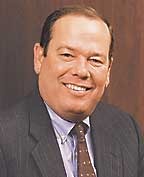Investing isn't a gamble...
Or why Texas Hold 'Em won't
fund your retirement
By Paul Valickus, CFA
President, St. Germain Investments
Special to PRIME
From an investment perspective, the poker craze has probably peaked or likely will soon. I have been in the investment business analyzing stocks, industries and trends, along with managing portfolios for over twenty years and America's current passion for Texas Hold 'em feels like a classic fad.
Remember Beenie Babies, Pokeman and the Internet stocks?
Anteing up is hot
Poker has reached the silly stage. There are numerous television networks covering Texas Hold 'em tournaments. Five years ago, poker was televised on one station (ESPN) and ratings were abysmal. Poker is a simple game that has absolutely no appeal unless gambling is involved.
Beyond Go Fish, Texas Hold 'em is the only card game that teenage boys know how to play. How many teenagers received poker chips last Christmas? Even charities are using poker tournaments to raise money for their favorite causes. You don't even need a friend to play poker. It is available 24/7 on the internet.
Will poker ever die? I doubt it. After all, gambling is the second oldest profession (obsession). Texas Hold 'em itself is not a new game. Its inception can be traced back to Las Vegas in 1949. For now, however, just make sure that you clear a space in the basement for your son's poker chips. You will need it soon.
For some, investing is a gamble
Many people equate investing with gambling. They often refer to the financial markets as a crap-shoot or casino. Nothing could be further from the truth. This is not to say that there are no gamblers in the market.
Investment gamblers (or speculators, if you prefer) are involved in the market for the same reason they would enter a poker tournament. They hope to make a fast buck based on "skill," perceived knowledge or just plain luck. Like gamblers, speculators typically have a very short-term time horizon and are willing to risk large sums on the result of an event like the flip of a card or a roll of dice. Very little research may be involved with the decision and the result is often an absolute win or loss for the participant. The speculator or gambler is usually left with nothing if he is wrong.
But done right,
it's a sure thing
Investing is not a game. An investor desires a return on the investment of some principal amount. Investment involves foregoing the current consumption or spending of the principal today (buying a boat for example) in anticipation of a earning a return sometime in the future. Your expected return is inversely correlated with the risk associated with the investment.
For example, an individual buying a house in six months should invest in a riskless U.S. Treasury Bill earning perhaps 3%. A potential retiree that expects to continue working for another fifteen or twenty years might consider investing in a diversified portfolio of common stocks that would entail more risk but provides an expected return of 10%.
The investor usually has a financial goal associated with their investment portfolio. Using the examples above they might include buying a home, saving for retirement or getting an even bigger boat sometime in the future. Funding a child's education and buying a second home are other noteworthy financial goals.
Both have their own 'tells'
Investing is work. Let's take buying a stock as an example. Treat a potential investment in a common stock as if you are a soon to become a part owner of the company (that is, in fact, exactly what is happening).
No intelligent buyer of a house or new car would finalize the purchase without performing the necessary due diligence.
No intelligent investor would buy a stock without doing research on the company. Do you understand what the company does? What are its growth prospects? Who are the competitors and how are they doing? What kind of reputation does the management have? How do they treat shareholders? What does the balance sheet look like? Is there too much debt? What is the company's track record? How have they done in market downturns or a poor economic environment? These are examples of the many questions that should be addressed when evaluating a potential investment.
So play your cards right
Remember, gambling is a game. Investing is a life long process that is geared to ensure that financial goals can be achieved. Saving and investing should be a major section of a family budget. Gambling is a line item listed under expenses in the subcategory of entertainment.
Column provided to PRIME by: St. Germain Investment Management; 1500 Main Street; Springfield, MA 01115
Phone is 413-733-5111 or 800-443-7624
www.djstgermain.com.
